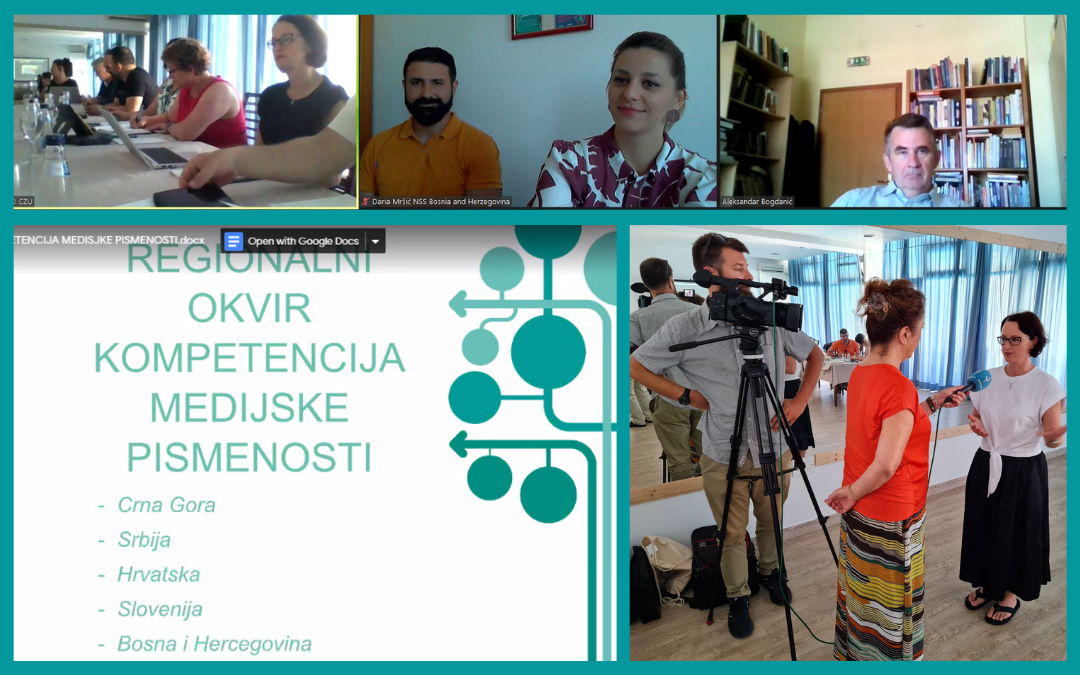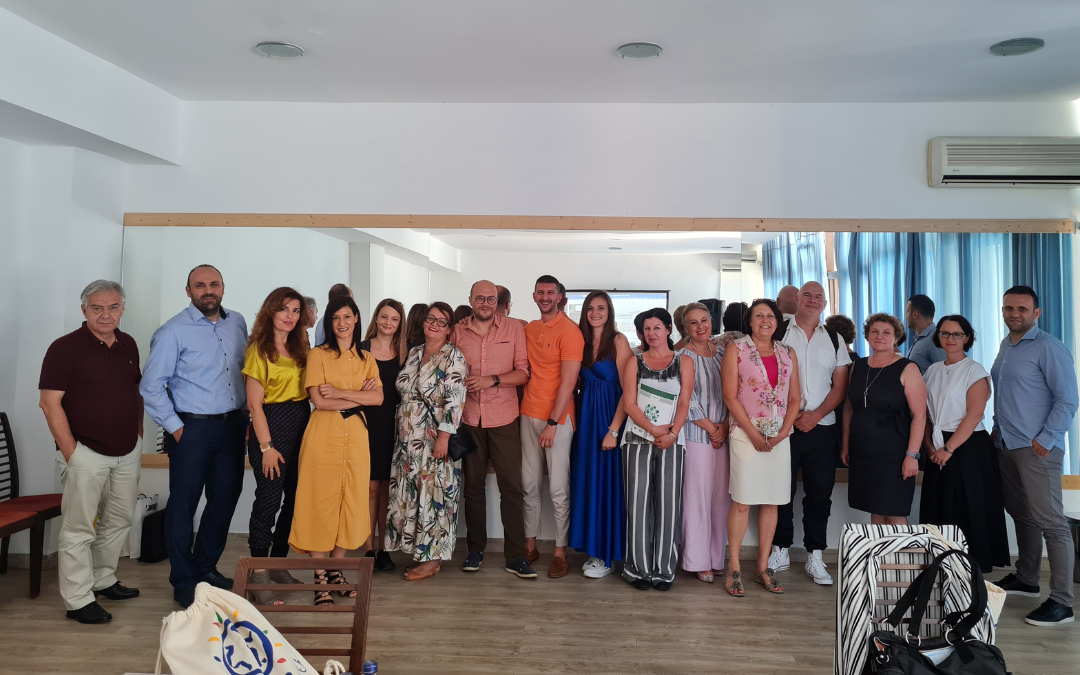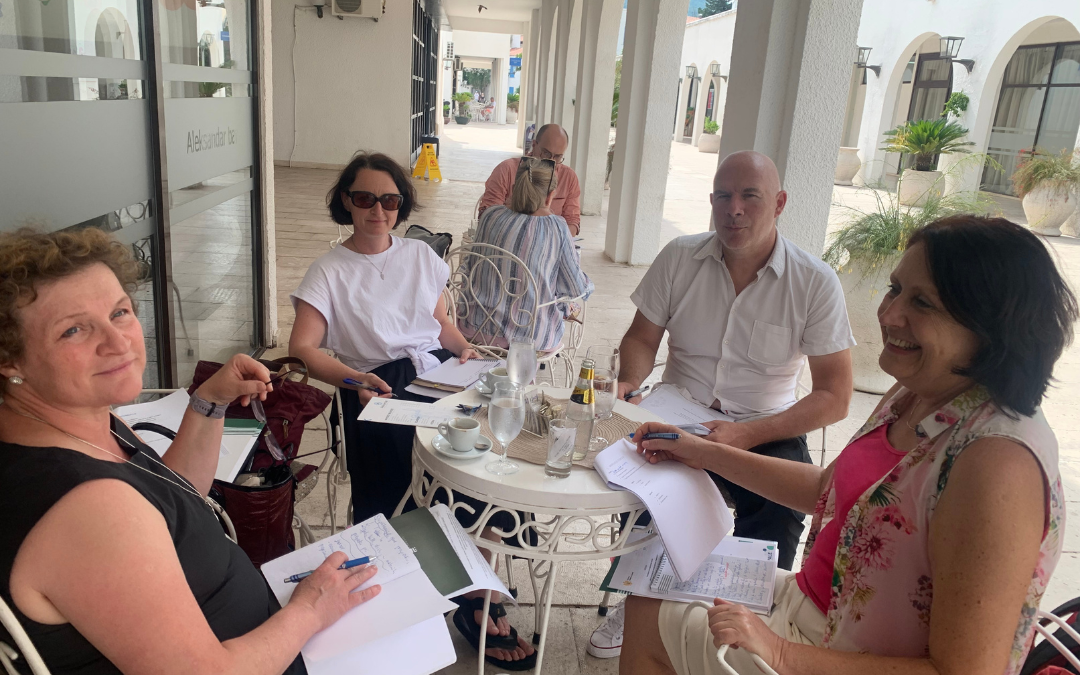Under the auspices of the Ministries of Education and Public Administration of Montenegro and the EPALE project, delegations from five countries participating in the EPALE 2022–2024 regional project on media literacy met on 23 and 24 June in Budva, Montenegro. We met partners from Montenegro, Bosnia and Herzegovina (unfortunately only online), Croatia, Slovenia and Serbia.
The leading stakeholders of this project are the NSS EPALE, which in the case of Slovenia is CMEPIUS. Besides Ana Stanovnik Perčič from this institution, the Slovenian delegation also consisted of Brigita Kruder (from Slovenska Bistrica AEC), Darijan Novak and the author of this article (both from the SIAE).
The purpose of the regional working meeting was to exchange our views on preparing the Regional Media Literacy Skills Framework. It is a standard of skills in individual areas of this type of literacy, which will be the basis for creating (non-formal) educational programmes to raise the level of media literacy in partner countries.
The joint preparation of the Regional Media Literacy Skills Framework is a logical continuation of the successful past cooperation with the EPALE Support Services of Serbia, Bosnia and Herzegovina, Montenegro and Croatia, with whom we have been cooperating in joint activities since the beginning of the platform’s operation. Past cooperation was limited to carrying out joint events and sharing experiences. This time, however, we tackled a more challenging task in an area where we draw from common perspectives, and our mutual diversity can further enrich the Media Literacy programme.
What followed was the work in medias res. The project coordinator, the NSS EPALE Montenegro, provided the participants with a draft of the mentioned Regional Framework before the meeting, which included six modules (Critical reading of the media message, Media and their values, Freedom of speech and hate speech, Disinformation, Manipulation and stereotypes, Privacy and data protection).
With its incredible power, the media is the key to freedom, peace and coexistence on the planet. But unfortunately, they contribute, perhaps even more so now, to the individual’s belittlement, separation from community and cooperation, thereby weakening them. Thus, the media only satisfies the interests of capital and establishes the united states of consumerism. The importance of public and independent media has never been greater, but they must represent people and not institutions, especially in areas torn by wars and emerging democracies. This also includes those with tradition. Free Assange!
At the meeting, we discussed the contents and new titles of the five modules below. Each country focused on the content of one of them:
- Critical reading and understanding of the media message (Croatia),
- The influence of media content on the formation of personal and social values (Serbia),
- Freedom of speech and hate speech (Montenegro),
- Manipulation, disinformation and stereotypes (Slovenia),
- Characteristics of modern media, privacy and data protection (Bosnia and Herzegovina).
The meeting gave me a better understanding of the very topical issue of media literacy. We addressed the theme from various aspects, which contributed to creating a set of five modules of the expected Skills Framework. In addition to us, adult educators, experts from this field, media literacy lecturers and journalists were also present at the meeting. Thus, our views were interestingly different but still complementary. Also beneficial was the international exchange of ideas, theories and practices, as it showed that despite our differences, we are similar in many ways. As a result, we enrich each other.
In the working groups, at the meeting (and later), we defined a short introduction, goals, learning outcomes, knowledge, skills and values, as well as key concepts for each module. We also made decisions regarding the structure of the entire document. We decided we will include – in addition to the explanations on the implementation of the EPALE project in the participating countries – an introduction in which the four goals of establishing the Regional Media Literacy Skills Framework are stated. It is about creating:
- education for democratic citizenship,
- conditions for promoting critical thinking,
- skills for functional media literacy,
- the individual’s ability to ethically use and act in the media sphere (active citizenship).
We also agreed to include a list of European and national references/sources and stakeholders in the field of media literacy. In the Slovenian delegation, we are also in favour of defining how to adapt the programme’s implementation to different target groups.
The media literacy of a socially active and engaged intellectual seems self-evident. We understand it as an inseparable part of “other” literacies that we practice daily in our work at our workplaces and in our private lives.
The confrontation of ideas between the members of the Slovenian delegation, which derive from our professional knowledge and personal experiences and beliefs, led to in-depth and critical discussions. We enriched them with our joint contribution to the document we created. At the working meeting, we realised that we speak several languages of media literacy. The latter also turned out to be excellent because such a socially important topic (almost) cannot be covered widely enough. Nevertheless, the point is to be aware of the manipulative nature of all information and media (even when perceived as positive and valuable). The multilingual nature of such meetings (each of us speaks our own language) is an experience that will always remain a pleasant memory and offers plenty of opportunities for learning, some frustration, and fun moments.
We agreed on the next steps that will lead us to the final version of the Regional Framework by the beginning of October and the training that will follow according to the upcoming teacher’s manual. The latter is another expected joint result of our cooperation. We will keep readers informed about our progress.
Zvonka Pangerc Pahernik, MSc (zvonka.pangerc@acs.si), SIAE



